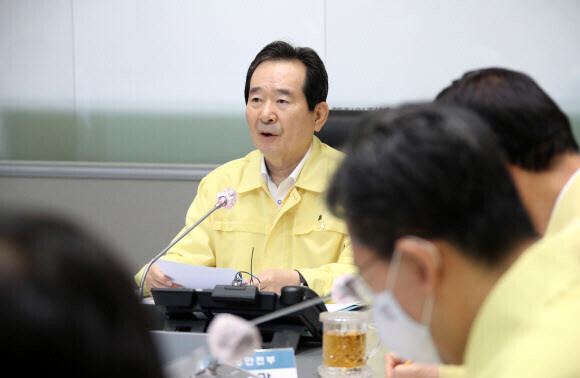hankyoreh
Links to other country sites 다른 나라 사이트 링크
S. Korean government tries to sooth public anger at housing crisis by forcing public officials to sell off excess property

The South Korean government and ruling Democratic Party are trying to soothe public anger by calling on senior government officials who own multiple houses to sell their superfluous property. This measure, which aims to produce an emotional response rather than tackle the root cause of the anger, appears to reflect the ruling party’s sense of urgency and desperation.
During a meeting of the government’s COVID-19 task force at the Central Government Complex in Seoul on July 8, Prime Minister Chung Sye-kyun instructed government ministries and local governments to quickly determine how many residential properties are owned by senior public servants and have them sell off their extra properties.
“The real estate issue has created major public discontent, and the government is working hard to come up with a solution. But as long as senior officials own multiple houses, they’re unlikely to earn the trust of the public regardless of what measures they take. That could render all measures useless,” Chung said.
“The time has come for senior officials to set an example. In fact, I’d say it’s overdue,” the prime minister added.
According to data about asset changes (as of Dec. 31, 2019) released by the public official ethics committee on Mar. 26, 248, or one-third, of the 750 officials in central government ministries and related organizations covered in the data own multiple homes. Among them, 196 owned two homes, 36 owned three, and 16 owned four or more.
The Democratic Party is also planning to accelerate the timetable for lawmakers selling off extra houses. “At the time of the general election, we promised that those properties would be sold off within two years, but the party is urging lawmakers to keep their promise even sooner so as to set a good example in stabilizing the real estate market,” said Kim Tae-nyeon, the party’s floor leader, during a leadership meeting. The party is currently tabulating exactly how many homes lawmakers own.
The Blue House finally announced that Noh Young-min, the president’s chief of staff, would sell an apartment in the Banpo neighborhood of Seoul’s Seocho District before the end of this month. The announcement came six days after Noh said on July 2 that he planned to sell an apartment in Cheongju, North Chungcheong Province, instead of the one in Banpo.
“Contrary to my intention, selling the apartment in Cheongju rather than the one in Seoul came across as an attempt to protect my Seoul apartment, which didn’t live up to public expectations. I feel sorry about that,” Noh said.
“I intend to take this as an opportunity to reflect on my actions and be stricter on myself.”
Noh’s decision to sell his Gangnam apartment puts the squeeze on the 11 Blue House officials at the rank of secretary or higher who own multiple homes. On July 2, Roh instructed them to sell off all but one of their homes within the month.
Some officials have apparently put homes up for sale within the past few days, while others are complaining about personal circumstances that make it impractical to sell their property.
“We are asking for a little patience since we still have time [before the end of the month]. However, we remain committed to setting an example that will be acceptable to the public,” a key official at the Blue House said.
“Considering that the chief of staff has sold [his house], the rest of the aides should allow their common sense to guide their decision,” another official said.
By Seong Yeon-cheol and Jung Hwan-bong, staff reporters
Please direct comments or questions to [english@hani.co.kr]

Editorial・opinion
![[Guest essay] Maybe Korea’s rapid population decline is an opportunity, not a crisis [Guest essay] Maybe Korea’s rapid population decline is an opportunity, not a crisis](https://flexible.img.hani.co.kr/flexible/normal/500/300/imgdb/original/2024/0430/9417144634983596.jpg) [Guest essay] Maybe Korea’s rapid population decline is an opportunity, not a crisis
[Guest essay] Maybe Korea’s rapid population decline is an opportunity, not a crisis![[Column] Can Yoon steer diplomacy with Russia, China back on track? [Column] Can Yoon steer diplomacy with Russia, China back on track?](https://flexible.img.hani.co.kr/flexible/normal/500/300/imgdb/original/2024/0430/1617144616798244.jpg) [Column] Can Yoon steer diplomacy with Russia, China back on track?
[Column] Can Yoon steer diplomacy with Russia, China back on track?- [Column] Season 2 of special prosecutor probe may be coming to Korea soon
- [Column] Park Geun-hye déjà vu in Yoon Suk-yeol
- [Editorial] New weight of N. Korea’s nuclear threats makes dialogue all the more urgent
- [Guest essay] The real reason Korea’s new right wants to dub Rhee a founding father
- [Column] ‘Choson’: Is it time we start referring to N. Korea in its own terms?
- [Editorial] Japan’s rewriting of history with Korea has gone too far
- [Column] The president’s questionable capacity for dialogue
- [Column] Are chaebol firms just pizza pies for families to divvy up as they please?
Most viewed articles
- 1Months and months of overdue wages are pushing migrant workers in Korea into debt
- 2[Guest essay] Maybe Korea’s rapid population decline is an opportunity, not a crisis
- 3Dermatology, plastic surgery drove record medical tourism to Korea in 2023
- 4Under conservative chief, Korea’s TRC brands teenage wartime massacre victims as traitors
- 5First meeting between Yoon, Lee in 2 years ends without compromise or agreement
- 6[Column] Can Yoon steer diplomacy with Russia, China back on track?
- 7[Editorial] Japan’s rewriting of history with Korea has gone too far
- 8[Editorial] When the choice is kids or career, Korea will never overcome birth rate woes
- 9[Column] Why Korea’s hard right is fated to lose
- 10Korean research team finds potential link between nanoplastics, obesity